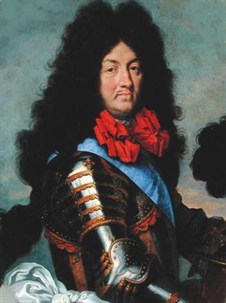Louis XIV of Bourbon
 Louis XIV (1638-1715) was King of France from 1643 until his death. The eldest son of Louis XIII and Anne of Austria, he actually took power only after the death of Cardinal Jules Mazarin. The minister-favourite had in fact ruled France during the minority of the king, addressing the revolt led by numerous members of the great aristocracy of the kingdom, the “Fronde”, and leading the country to victory in the long war against Spain (Peace of Pyrenees, 1659). The reign of Louis XIV is known to history as the triumph of absolutism, or the practice of government which saw all the functions of power at court concentrated in the single person of the sovereign. Although this view has now been scaled by historians, it is beyond doubt that the Sun King has developed and brought to completion the project of state order already started by Cardinals Richelieu and Mazarin. His finance minister, Jean-Baptiste Colbert, gave rise to mercantilist economic policies, that were inclined to promote exports, especially of high-quality over imports. Louis XIV promoted other important internal reforms and established himself as a powerful patron and protector of artists and writers. He built the palace of Versailles and decided upon the abolition of the Edict of Nantes (1685), which guaranteed freedom of religion to the Huguenots. In foreign policy, France was at war during most of his long reign, thus leaving a legacy of a very critical financial situation.
Louis XIV (1638-1715) was King of France from 1643 until his death. The eldest son of Louis XIII and Anne of Austria, he actually took power only after the death of Cardinal Jules Mazarin. The minister-favourite had in fact ruled France during the minority of the king, addressing the revolt led by numerous members of the great aristocracy of the kingdom, the “Fronde”, and leading the country to victory in the long war against Spain (Peace of Pyrenees, 1659). The reign of Louis XIV is known to history as the triumph of absolutism, or the practice of government which saw all the functions of power at court concentrated in the single person of the sovereign. Although this view has now been scaled by historians, it is beyond doubt that the Sun King has developed and brought to completion the project of state order already started by Cardinals Richelieu and Mazarin. His finance minister, Jean-Baptiste Colbert, gave rise to mercantilist economic policies, that were inclined to promote exports, especially of high-quality over imports. Louis XIV promoted other important internal reforms and established himself as a powerful patron and protector of artists and writers. He built the palace of Versailles and decided upon the abolition of the Edict of Nantes (1685), which guaranteed freedom of religion to the Huguenots. In foreign policy, France was at war during most of his long reign, thus leaving a legacy of a very critical financial situation.
Read more
- P. Burke, The Fabrication of Louis XIV, New Haven-London 1992.
- J. Duindam, Vienna and Versailles. The Courts of Europe’s Dynastic Rivals, 1550-1780, Cambridge 2003.
- L. Bély, Louis XIV. Le plus grand roi du Monde, Paris, 2005.
